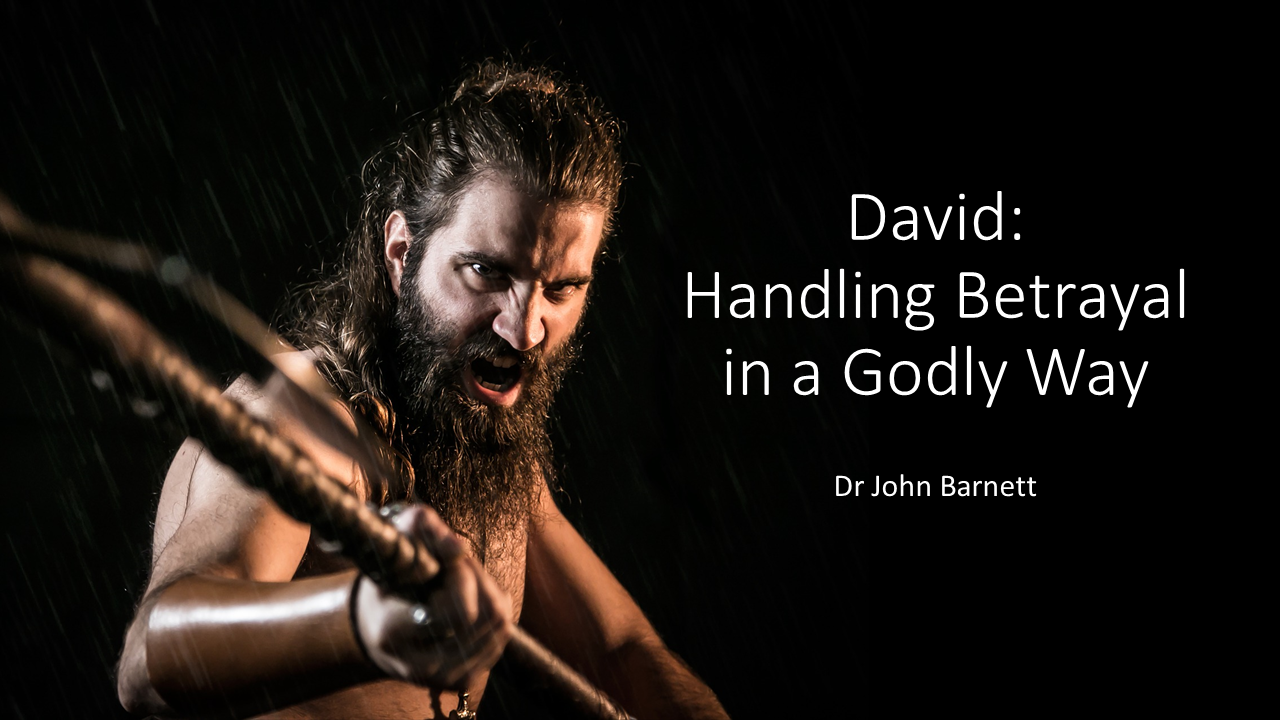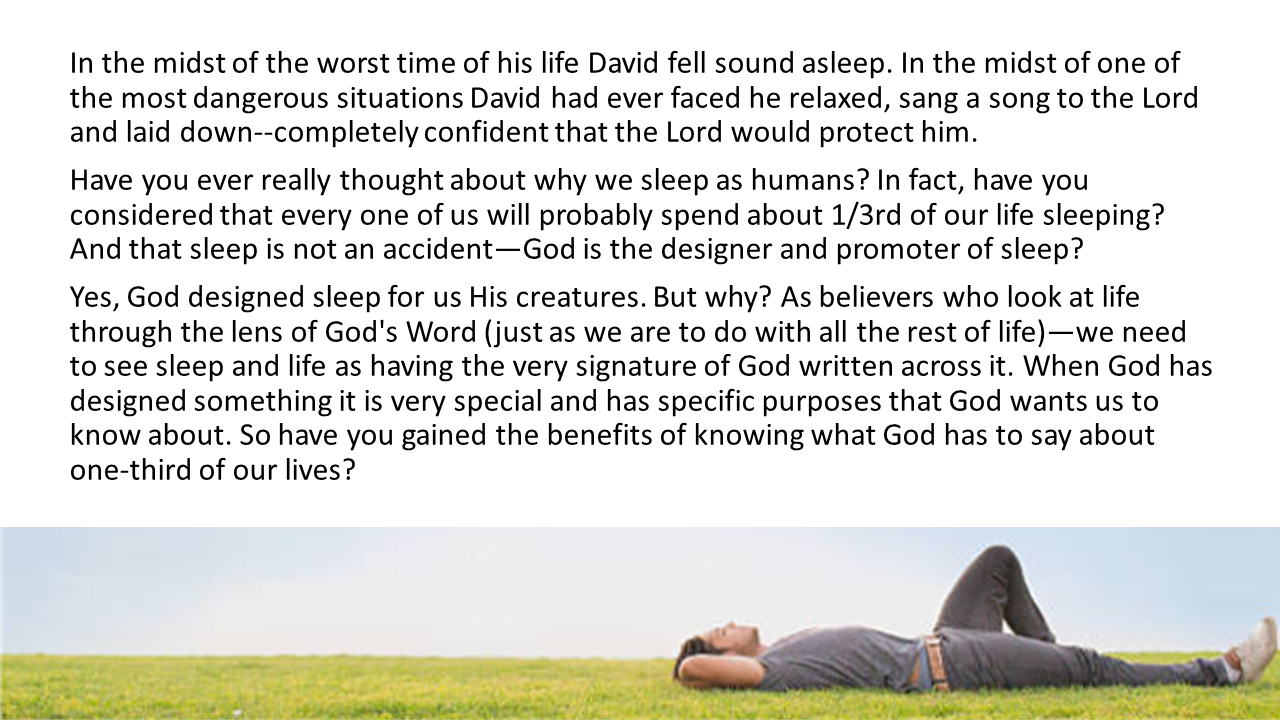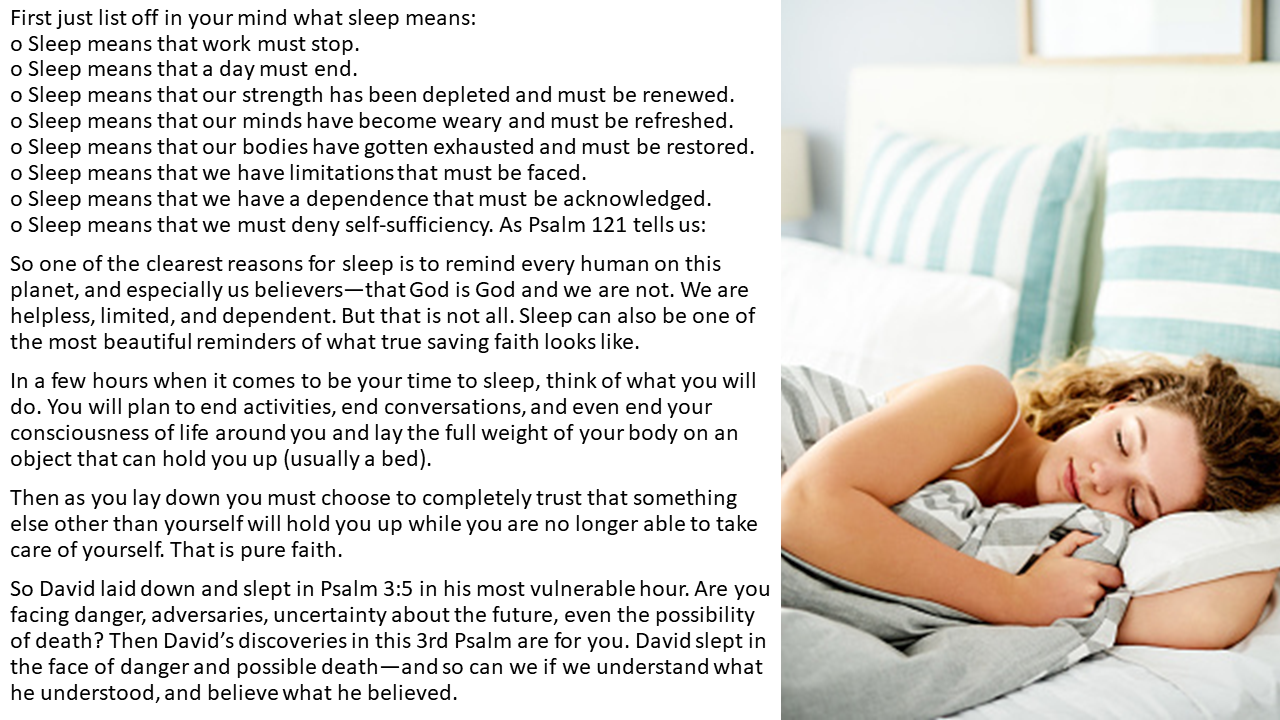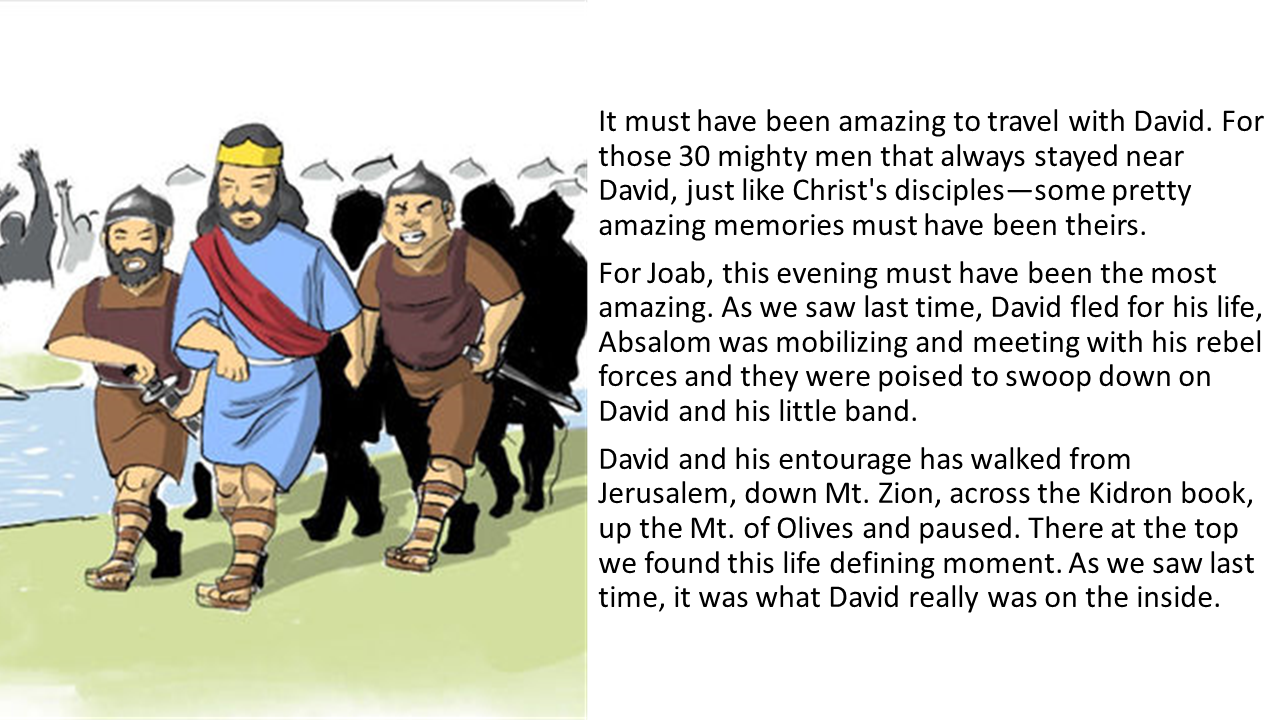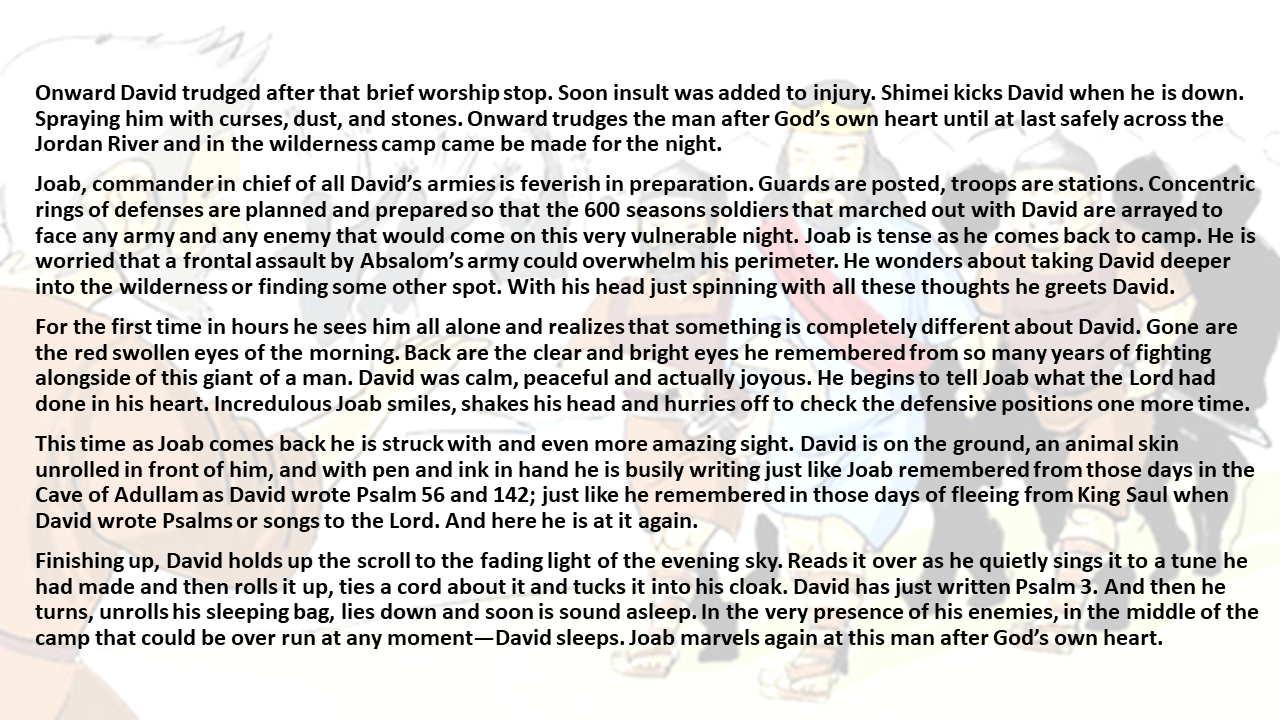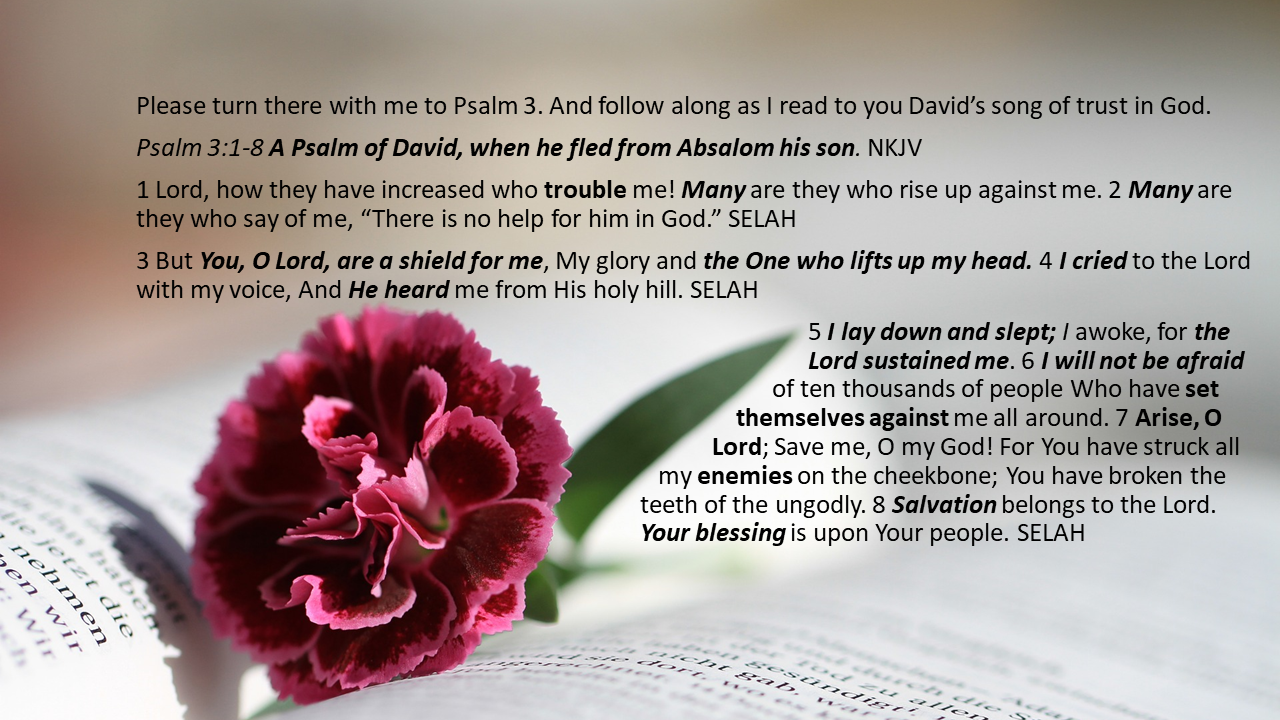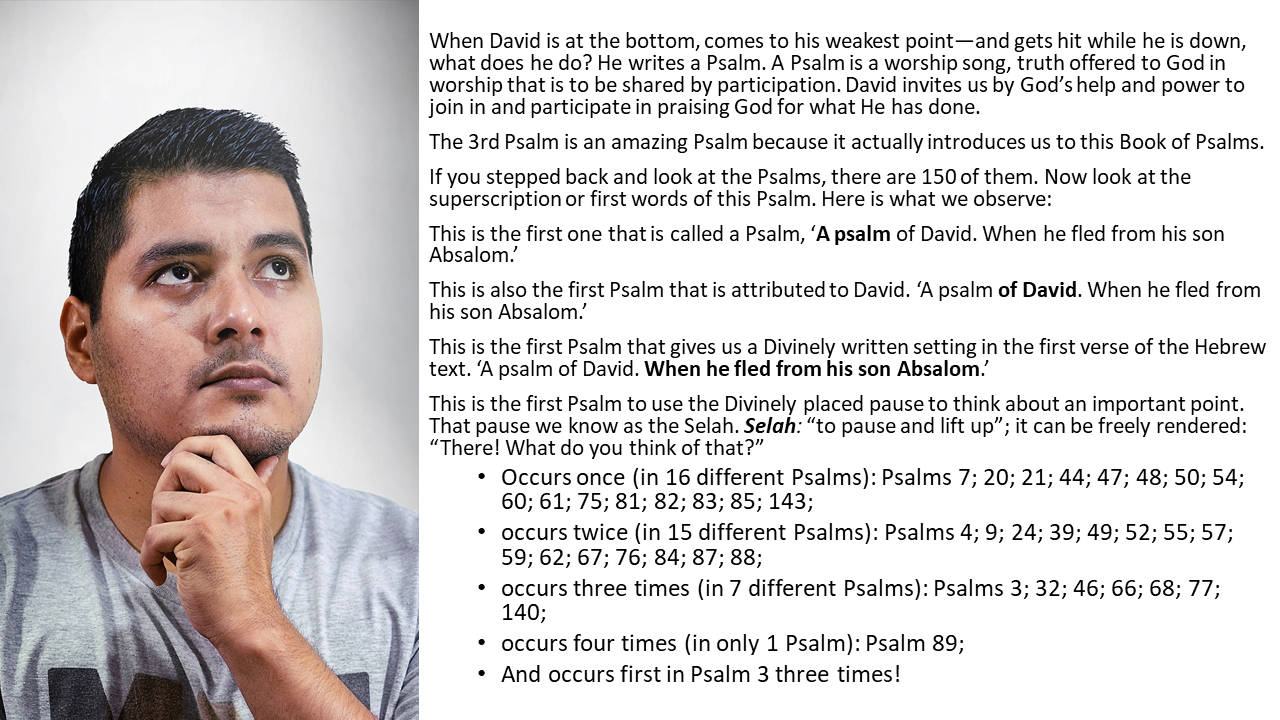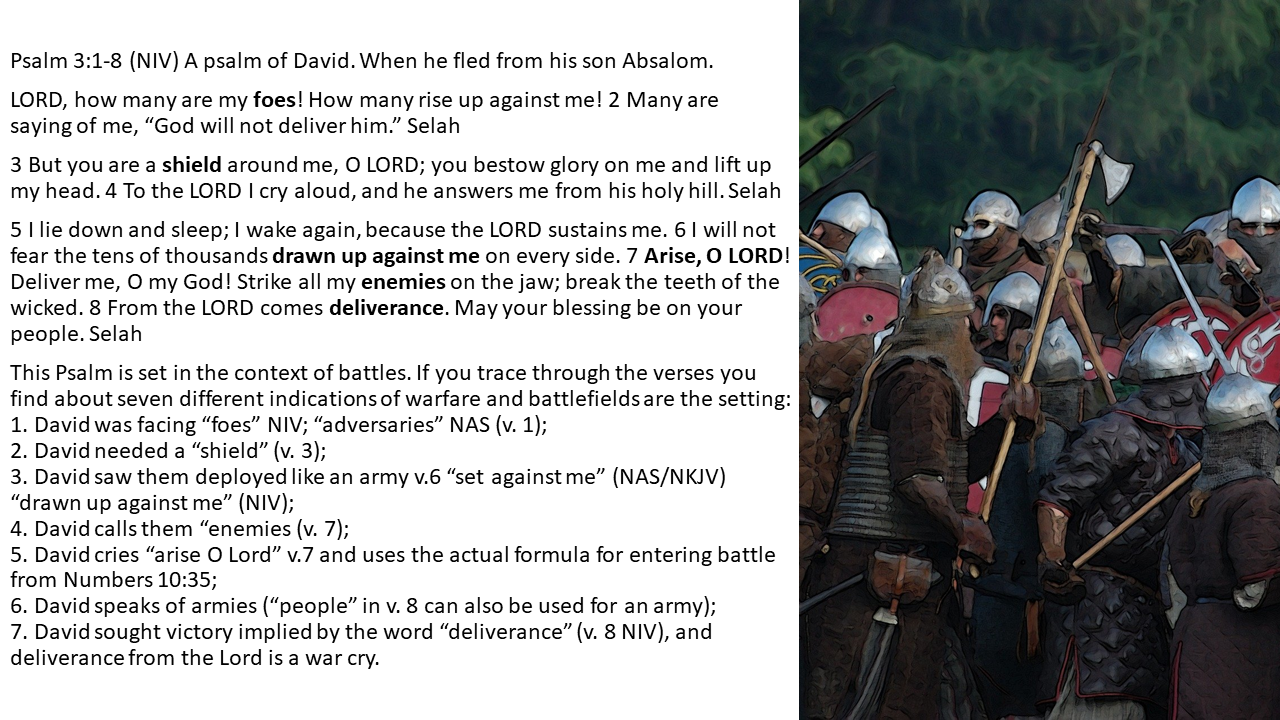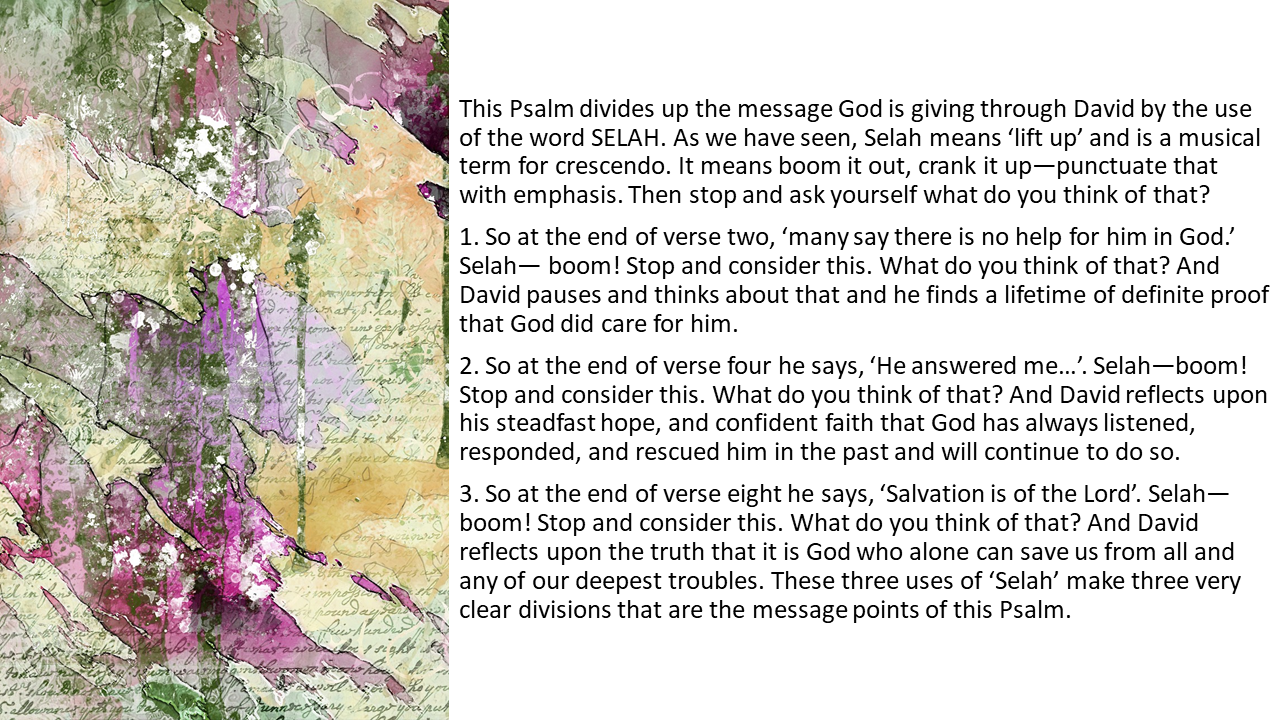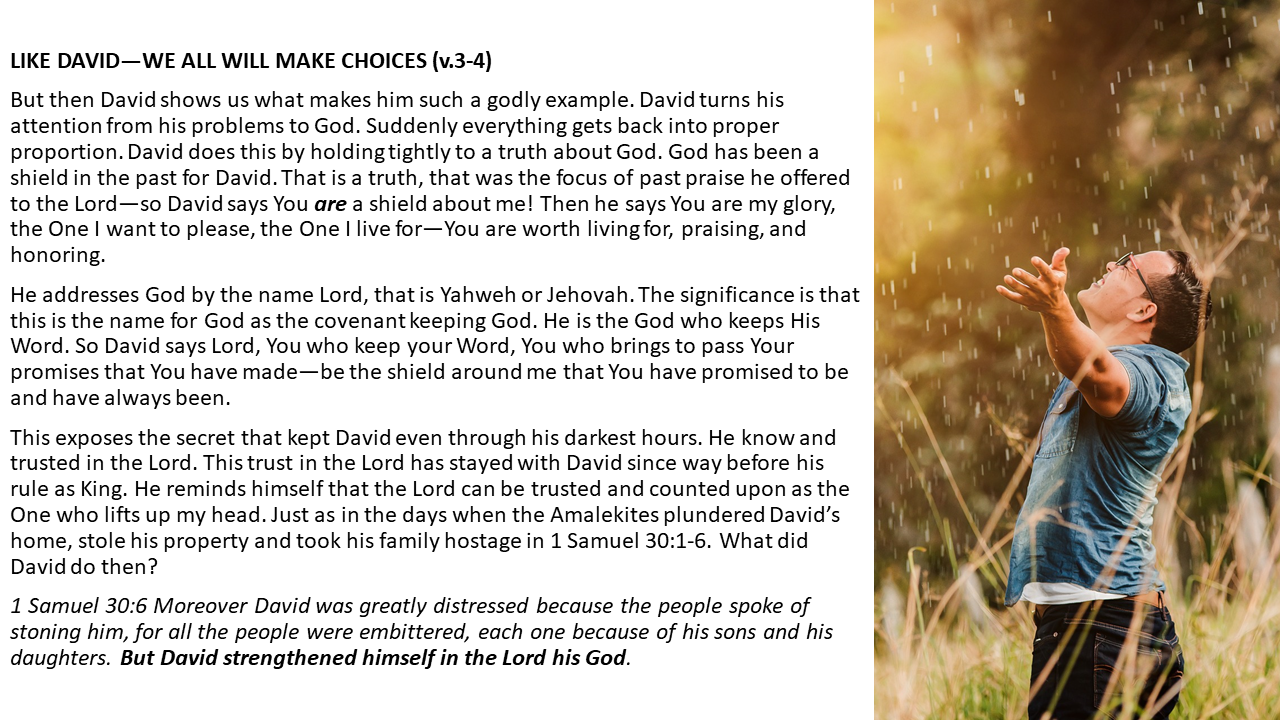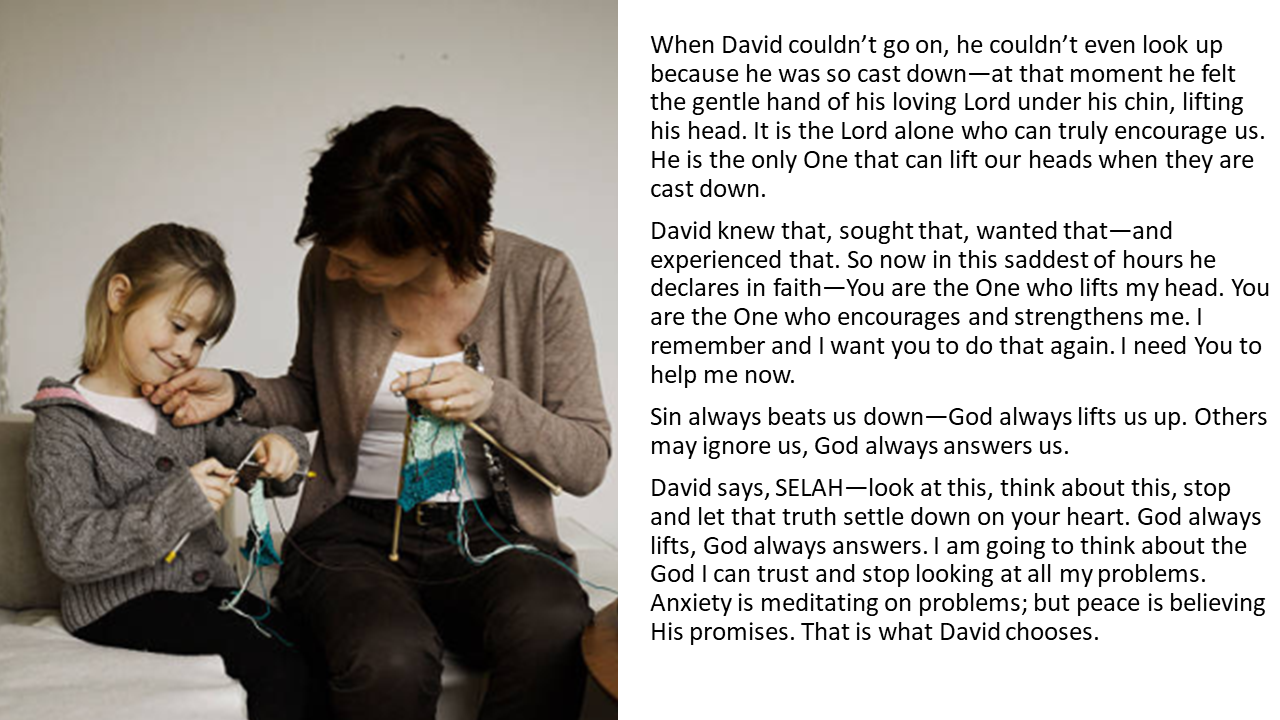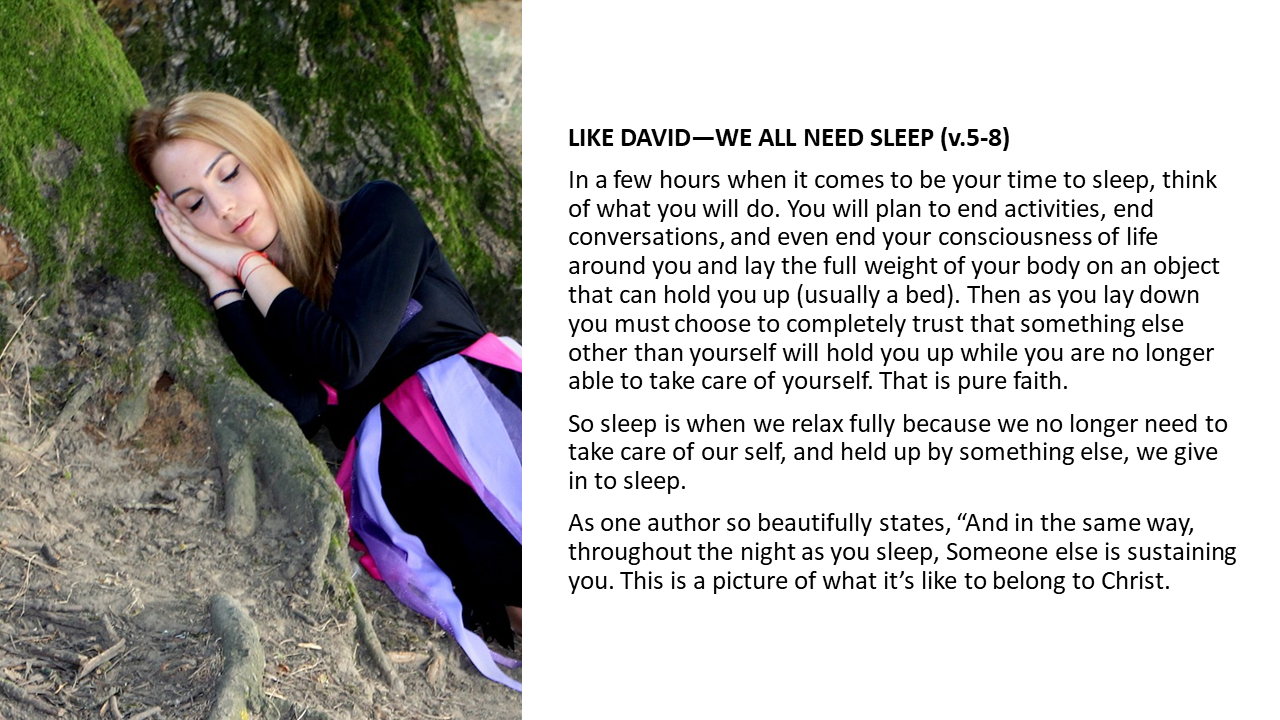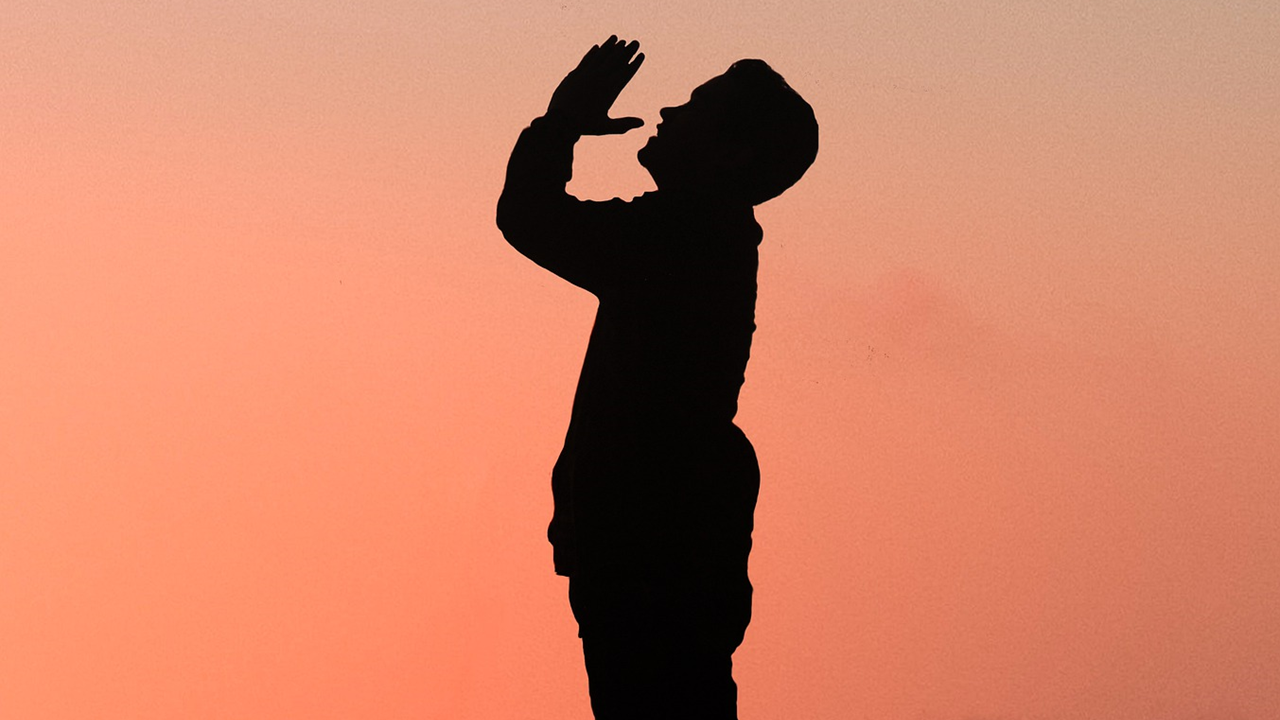If the YouTube video above is not available, here are two other ways to view:
Handling Betrayal in a Godly Way
060827PM
DSS-37
Psalm 3
 In the midst of the worst time of his life David fell sound asleep. In the midst of one of the most dangerous situations David had ever faced he relaxed, sang a song to the Lord and laid down–completely confident that the Lord would protect him.
In the midst of the worst time of his life David fell sound asleep. In the midst of one of the most dangerous situations David had ever faced he relaxed, sang a song to the Lord and laid down–completely confident that the Lord would protect him.
Have you ever really thought about why we sleep as humans? In fact, have you considered that every one of us will probably spend about 1/3rd of our life sleeping? And that sleep is not an accident—God is the designer and promoter of sleep?
Yes, God designed sleep for us His creatures. But why? As believers who look at life through the lens of God’s Word (just as we are to do with all the rest of life)—we need to see sleep and life as having the very signature of God written across it. When God has designed something it is very special and has specific purposes that God wants us to know about. So have you gained the benefits of knowing what God has to say about one-third of our lives?
EVER THOUGHT ABOUT SLEEP?
First just list off in your mind what sleep means:
- Sleep means that work must stop.
- Sleep means that a day must end.
- Sleep means that our strength has been depleted and must be renewed.
- Sleep means that our minds have become weary and must be refreshed.
- Sleep means that our bodies have gotten exhausted and must be restored.
- Sleep means that we have limitations that must be faced.
- Sleep means that we have a dependence that must be acknowledged.
- Sleep means that we must deny self-sufficiency. As Psalm 121 tells us:
So one of the clearest reasons for sleep is to remind every human on this planet, and especially us believers—that God is God and we are not. We are helpless, limited, and dependent. But that is not all. Sleep can also be one of the most beautiful reminders of what true saving faith looks like.
In a few hours when it comes to be your time to sleep, think of what you will do. You will plan to end activities, end conversations, and even end your consciousness of life around you and lay the full weight of your body on an object that can hold you up (usually a bed). Then as you lay down you must choose to completely trust that something else other than yourself will hold you up while you are no longer able to take care of yourself. That is pure faith. So David laid down and slept in Psalm 3:5 in his most vulnerable hour. Are you facing danger, adversaries, uncertainty about the future, even the possibility of death? Then David’s discoveries in this 3rd Psalm are for you. David slept in the face of danger and possible death—and so can we if we understand what he understood, and believe what he believed.
It must have been amazing to travel with David. For those 30 mighty men that always stayed near David, just like Christ’s disciples—some pretty amazing memories must have been their’s.
For Joab, this evening must have been the most amazing. As we saw last time, David fled for his life, Absalom was mobilizing and meeting with his rebel forces and they were poised to swoop down on David and his little band.
David and his entourage has walked from Jerusalem, down Mt. Zion, across the Kidron book, up the Mt. of Olives and paused. There at the top we found this life defining moment. As we saw last time, it was what David really was on the inside.
WORSHIP THROUGH TEARS
 When David was at his lowest moment of his life–he bows and worshipped and offered up a Psalm of praise to God—even through bitter tears of sorrow and grief.
When David was at his lowest moment of his life–he bows and worshipped and offered up a Psalm of praise to God—even through bitter tears of sorrow and grief.
2 Samuel 15:30, 32 So David went up by the Ascent of the Mount of Olives, and wept as he went up; and he had his head covered and went barefoot. And all the people who were with him covered their heads and went up, weeping as they went up. 32 Now it happened when David had come to the top of the mountain, where he worshiped God—there was Hushai the Archite coming to meet him with his robe torn and dust on his head. NKJV
God’s servants can continue in worship even when life is tough, difficult, and almost looking like it is impossible to go on. That is what we find in the exact record of the worship that flowed from David’s heart and onto paper as Psalm 3.
This song David shares is what can flow from us if we like him—bow in worship when the bitter tears of sorrow and grief fall across our lives.
David trusted God’s control. He relied upon it and prayed for it. Instead of fear he had faith and gave worship.
Onward David trudged after that brief worship stop. Soon insult was added to injury. Shimei kicks David when he is down. Spraying him with curses, dust, and stones. Onward trudges the man after God’s own heart until at last safely across the Jordan River and in the wilderness camp came be made for the night.
Joab, commander in chief of all David’s armies is feverish in preparation. Guards are posted, troops are stations. Concentric rings of defenses are planned and prepared so that the 600 seasons soldiers that marched out with David are arrayed to face any army and any enemy that would come on this very vulnerable night.
Joab is tense as he comes back to camp. He is worried that a frontal assault by Absalom’s army could overwhelm his perimeter. He wonders about taking David deeper into the wilderness or finding some other spot. With his head just spinning with all these thoughts he greets David.
For the first time in hours he sees him all alone and realizes that something is completely different about David. Gone are the red swollen eyes of the morning. Back are the clear and bright eyes he remembered from so many years of fighting alongside of this giant of a man. David was calm, peaceful and actually joyous. He begins to tell Joab what the Lord had done in his heart. Incredulous Joab smiles, shakes his head and hurries off to check the defensive positions one more time.
This time as Joab comes back he is struck with and even more amazing sight. David is on the ground, an animal skin unrolled in front of him, and with pen and ink in hand he is busily writing just like Joab remembered from those days in the Cave of Adullam as David wrote Psalm 56 and 142; just like he remembered in those days of fleeing from King Saul when David wrote Psalms or songs to the Lord. And here he is at it again.
Finishing up, David holds up the scroll to the fading light of the evening sky. Reads it over as he quietly sings it to a tune he had made and then rolls it up, ties a cord about it and tucks it into his cloak. David has just written Psalm 3. And then he turns, unrolls his sleeping bag, lies down and soon is sound asleep. In the very presence of his enemies, in the middle of the camp that could be over run at any moment—David sleeps. Joab marvels again at this man after God’s own heart.
TRUSTING GOD—NO MATTER WHAT
Please turn there with me to Psalm 3. And follow along as I read to you David’s song of trust in God.
Psalm 3:1-8 A Psalm of David, when he fled from Absalom his son. NKJV
- 1 Lord, how they have increased who trouble me! Many are they who rise up against me.
- 2 Many are they who say of me, “There is no help for him in God.” SELAH
- 3 But You, O Lord, are a shield for me, My glory and the One who lifts up my head.
- 4 I cried to the Lord with my voice, And He heard me from His holy hill. SELAH
- 5 I lay down and slept; I awoke, for the Lord sustained me.
- 6 I will not be afraid of ten thousands of people Who have set themselves against me all around.
- 7 Arise, O Lord; Save me, O my God! For You have struck all my enemies on the cheekbone; You have broken the teeth of the ungodly.
- 8 Salvation belongs to the Lord. Your blessing is upon Your people. SELAH
Pray.
When David is at the bottom, comes to his weakest point—and gets hit while he is down, what does he do?
He writes a Psalm. A Psalm is a worship song, truth offered to God in worship that is to be shared by participation. David invites us by God’s help and power to join in and participate in praising God for what He has done.
The 3rd Psalm is an amazing Psalm because it actually introduces us to this Book of Psalms.
If you stepped back and look at the Psalms, there are 150 of them. Now look at the superscription or first words of this Psalm. Here is what we observe:
- This is the first one that is called a Psalm, ‘A psalm of David. When he fled from his son Absalom.’
- This is also the first Psalm that is attributed to David. ‘A psalm of David. When he fled from his son Absalom.’
- This is the first Psalm that gives us a Divinely written setting in the first verse of the Hebrew text. ‘A psalm of David. When he fled from his son Absalom.’
- This is the first Psalm to use the Divinely placed pause to think about an important point. That pause we know as the Selah.
Selah: “to pause and lift up”; it can be freely rendered: “There! What do you think of that?”
- Occurs once (in 16 different Psalms): Psalms 7; 20; 21; 44; 47; 48; 50; 54; 60; 61; 75; 81; 82; 83; 85; 143;
- occurs twice (in 15 different Psalms): Psalms 4; 9; 24; 39; 49; 52; 55; 57; 59; 62; 67; 76; 84; 87; 88;
- occurs three times (in 7 different Psalms): Psalms 3; 32; 46; 66; 68; 77; 140;
- occurs four times (in only 1 Psalm): Psalm 89;
- And occurs first in Psalm 3 three times!
Psalm 3:1-8 (NIV) A psalm of David. When he fled from his son Absalom.
- LORD, how many are my foes! How many rise up against me! 2 Many are saying of me, “God will not deliver him.” Selah
- 3 But you are a shield around me, O LORD; you bestow glory on me and lift up my head. 4 To the LORD I cry aloud, and he answers me from his holy hill. Selah
- 5 I lie down and sleep; I wake again, because the LORD sustains me. 6 I will not fear the tens of thousands drawn up against me on every side. 7 Arise, O LORD! Deliver me, O my God! Strike all my enemies on the jaw; break the teeth of the wicked. 8 From the LORD comes deliverance. May your blessing be on your people. Selah
This Psalm is set in the context of battles. If you trace through the verses you find about seven different indications of warfare and battlefields are the setting:
1. David was facing “foes” NIV; “adversaries” NAS (v. 1);
2. David needed a “shield” (v. 3);
3. David saw them deployed like an army v.6 “set against me” (NAS/NKJV) “drawn up against me” (NIV);
4. David calls them “enemies (v. 7);
5. David cries “arise O Lord” v.7 and uses the actual formula for entering battle from Numbers 10:35;
6. David speaks of armies (“people” in v. 8 can also be used for an army);
7. David sought victory implied by the word “deliverance” (v. 8 NIV), and deliverance from the Lord is a war cry.
This Psalm divides up the message God is giving through David by the use of the word SELAH. As we have seen, Selah means ‘lift up’ and is a musical term for crescendo. It means boom it out, crank it up—punctuate that with emphasis. Then stop and ask yourself what do you think of that?
1. So at the end of verse two, ‘many say there is no help for him in God.’ Selah— boom! Stop and consider this. What do you think of that? And David pauses and thinks about that and he finds a lifetime of definite proof that God did care for him.
2. So at the end of verse four he says, ‘He answered me…’. Selah—boom! Stop and consider this. What do you think of that? And David reflects upon his steadfast hope, and confident faith that God has always listened, responded, and rescued him in the past and will continue to do so.
3. So at the end of verse eight he says, ‘Salvation is of the Lord’. Selah—boom! Stop and consider this. What do you think of that? And David reflects upon the truth that it is God who alone can save us from all and any of our deepest troubles.
These three uses of ‘Selah’ make three very clear divisions that are the message points of this Psalm.
 LIKE DAVID—WE ALL WILL FACE BATTLEFIELDS (v.1-2)
LIKE DAVID—WE ALL WILL FACE BATTLEFIELDS (v.1-2)
What we need to remember as we look at this Psalm is that we all are facing battles as we go through every day life. Think about the workplace—it is cutthroat these days. Enduring personal attacks and abuse are the norm as more and more people are competing for fewer and fewer good jobs with less and less job security.
This prompts the use of weapons such as lying, slander, gossip, misrepresentation, bribes, stealing, falsification and blame shifting—all to gain personal advancement. And how many enemies does it take to make life miserable? Just one that is persistent.
Also, it may not be the workplace that becomes our battlefield, it may be our home. Maybe you and I will never face an army led by our son seeking to destroy us and take our throne like David was facing—but we may someday face the slander, attack, and abuse through the hatred of our children. We may face them betraying what we stand for and even seeking to undermine our family unity, or discredit and destroy us as parents.
We can face slander, attack or abuse like David faced in another way—coming from the closest on earth to us our husband or wife when they turn against us with no warning, desert us, seek to harm us or just torment us by breaking the lasting promise they made in marriage.
Others may face parents that turn against them, abandon them, and are slanderous and abusive against their very own children. Life is hard, sin is horrible, and people seem to be able to harm other so easily. So that is why David says SELAH. He is saying stop, look around—and think about your battle.
LIKE DAVID—WE ALL WILL MAKE CHOICES (v.3-4)
But then David shows us what makes him such a godly example. David turns his attention from his problems to God. Suddenly everything gets back into proper proportion. David does this by holding tightly to a truth about God. God has been a shield in the past for David. That is a truth, that was the focus of past praise he offered to the Lord—so David says You are a shield about me! Then he says You are my glory, the One I want to please, the One I live for—You are worth living for, praising, and honoring.
He addresses God by the name Lord, that is Yahweh or Jehovah. The significance is that this is the name for God as the covenant keeping God. He is the God who keeps His Word. So David says Lord, You who keep your Word, You who brings to pass Your promises that You have made—be the shield around me that You have promised to be and have always been.
This exposes the secret that kept David even through his darkest hours. He know and trusted in the Lord. This trust in the Lord has stayed with David since way before his rule as King. He reminds himself that the Lord can be trusted and counted upon as the One who lifts up my head. Just as in the days when the Amalekites plundered David’s home, stole his property and took his family hostage in 1 Samuel 30:1-6. What did David do then?
1 Samuel 30:6 Moreover David was greatly distressed because the people spoke of stoning him, for all the people were embittered, each one because of his sons and his daughters. But David strengthened himself in the Lord his God.
When David couldn’t go on, he couldn’t even look up because he was so cast down—at that moment he felt the gentle hand of his loving Lord under his chin, lifting his head. It is the Lord alone who can truly encourage us. He is the only One that can lift our heads when they are cast down.
David knew that, sought that, wanted that—and experienced that. So now in this saddest of hours he declares in faith—You are the One who lifts my head. You are the One who encourages and strengthens me. I remember and I want you to do that again. I need You to help me now.
Sin always beats us down—God always lifts us up.
Others may ignore us, God always answers us. SELAH
See that? David says, SELAH—look at this, think about this, stop and let that truth settle down on your heart. God always lifts, God always answers. I am going to think about the God I can trust and stop looking at all my problems. Anxiety is meditating on problems; but peace is believing His promises. That is what David chooses.
LIKE DAVID—WE ALL NEED SLEEP (v.5-8)
Have you ever really thought about why we sleep as humans? In fact, have you considered that every one of us will probably spend about 1/3rd of our life sleeping? And that sleep is not an accident—God is the designer and promoter of sleep?
Yes, God designed sleep for us His creatures. But why? As believers who look at life through the lens of God’s Word (just as we are to do with all the rest of life)—we need to see sleep and life as having the very signature of God written across it. When God has designed something it is very special and has specific purposes that God wants us to know about. So have you gained the benefits of knowing what God has to say about one-third of our lives?
First just list off in your mind what sleep means:
- Sleep means that work must stop.
- Sleep means that a day must end.
- Sleep means that our strength has been depleted and must be renewed.
- Sleep means that our minds have become weary and must be refreshed.
- Sleep means that our bodies have gotten exhausted and must be restored.
- Sleep means that we have limitations that must be faced.
- Sleep means that we have a dependence that must be acknowledged.
- Sleep means that we must deny self-sufficiency. As Psalm 121 tells us:
So one of the clearest reasons for sleep is to remind every human on this planet, and especially us believers—that God is God and we are not. We are helpless, limited, and dependent. But that is not all. Sleep can also be one of the most beautiful reminders of what true saving faith looks like.
In a few hours when it comes to be your time to sleep, think of what you will do. You will plan to end activities, end conversations, and even end your consciousness of life around you and lay the full weight of your body on an object that can hold you up (usually a bed). Then as you lay down you must choose to completely trust that something else other than yourself will hold you up while you are no longer able to take care of yourself. That is pure faith.
So sleep is when we relax fully because we no longer need to take care of our self, and held up by something else, we give in to sleep.
As one author so beautifully states,
“And in the same way, throughout the night as you sleep, Someone else is sustaining you. This is a picture of what it’s like to belong to Christ.”1
For me it was in the fall of 1962 when as a child I believed the simple proclamation of the Gospel given me by my mother. I was a sinner, clearly unable to save myself, facing the penalty of God’s wrath for my sin. But in simple and true faith as a child I believed on the Lord Jesus Christ as my Savior and God performed the miracle of salvation inside of me. He took my sins and gave me His life. I began a walk of growing to trust Him more and more, and myself less and less.
Sleep is a gift from God for each of us to get all ready to start over again all refreshed and renewed, tomorrow. It is also a picture of how much we need God, and even more how we receive His salvation. Sleep should decimate any pride we have in our own power or might and humble us to think how weak and needy we really are.
Tonight as you crawl into your bed, pause to remember as you entrust your body to be held securely through the night—lift your heart in worship to God who holds your soul in the sweet comfort of laying secure in His arms. Tell the Lord you are also resting your life in Him. Whisper that you completely need Him, trust in His care—and ask Him to get rid of any pride you may have built up throughout the day.
That is the supreme peace that David felt as he lay down in the presence of his enemies and slept. So should we. Humbly, and in complete dependence upon our Lord!
 LIKE DAVID—WE ALL HAVE PROBLEMS (v. 10)
LIKE DAVID—WE ALL HAVE PROBLEMS (v. 10)
Did I mention that one word in this Psalm that weighs heaviest on David? It says in the attribution line, Psalm 3:1-8 (NIV) ‘A psalm of David. when he fled from his son Absalom.’
All of this painful abuse, unexpected attack, and life endangerment is because of his own son. What could ever lead to a son that rapes his own sister? Or what would ever incite a son that murders his own brother? Or as we see here, what could drive a son that tries to murder his own father? One word answers all three—sin! It was sin that led Amnon to rape Tamar, that prompted Absalom to murder Amnon, and drove Absalom to seek his father’s death.
But all of these reflect upon David as a father. David’s life situation we are studying opens another subject God’s Word explains to us. David is struggling through one of the greatest challenges in life–raising children.
After years of combing through every verse of the Bible dozens of times, I still haven’t found the perfect family—a family with a godly dad, a godly mom, and children who are submissive their entire time at home, and grow up to move on into godly marriages and homes. This just isn’t recorded in the Bible.
What we do find in God’s Word are some godly parents who have both godly and ungodly children; we also find some ungodly parents who have all ungodly children, while other ungodly parents end up with some godly children. There just doesn’t seem to be a parenting pattern that always works. So what is the answer for us as we parent? When God blesses us with children, He asks us to give them back to Him in dedication. That is what Christ’s parents did way back in Luke 2:22. That is also what godly parents have done through the centuries.
When we as parents present our children in dedication back to the Lord, we are declaring: “These children belong to You, Lord.” Dedication is our public acknowledgment of God’s ownership of them (Psalm 127:3). We can then rest in the joyful reality of being stewards of the promises of God’s Word.
But what happens when we dedicate them and they don’t turn out as we had hoped and planned?
The Bible repeatedly records godly men and women with less than godly children. That is because godliness is a choice; it is an obedient response to the Lord.
Godly children can not be made; nor can godliness be forced upon them. They grow that way, by God’s grace, with—or sometimes even without—godly parenting.
The bottom line of Scripture is that God never holds us responsible for how our children turn out—only for how we raised them.
So let me remind you again of the truths parents affirm when they hold up their precious children to the Lord in dedication of themselves to godly parenting as stewards of their children for the Lord:
I will raise the children God gives me for His glory;
I will surrender them back to Him;
I will have His peace when it is hard, and when they are making their own choices that will shape their future lives;
I will always pray for them, always love them, and no matter what happens—
I will have God’s peace because I gave them to Him—and raised them for Him as best as I knew how and could do.
What comfort is there for parents when this happens? When children do not follow the Lord and turn away from Him and sometimes even us? What hope can we have after all the years we loved them, earnestly prayed for them, read God’s Word to them, nurtured them in the ways of the Lord, and sought to guide them as best we could? Here are some truths that comfort our hearts—and the hearts of the many parents we have encouraged over the years:
Some lessons we can see in David’s life as we reflect upon Absalom’s Rebellion . . .
1. Absalom’s Rebellion was no surprise to God. Every day of our life (Psalm 139) was written in His book—even the darkest of days!
2. Absalom’s Rebellion was an opportunity for God to see David’s response. Our response is what matters to God most. He is watching and waiting for what we will do, to whom we will turn—and when we turn to Him, our Lord is glorified.
3. Absalom’s Rebellion must have driven David to pray for what he may have though impossible—Absalom’s return to the Lord and to David.
4. Absalom’s Rebellion opened to David a situation where only God can encourage him in times like that (I Samuel 30:6b)!
5. Absalom’s Rebellion filled David with hope as he remembered that God wasn’t ever through with him as long as he lived—and neither is He ever through with our wayward child.
6. Absalom’s Rebellion reminded David that he had a perfect heavenly Father as he see our own imperfections reflected by his son.
7. Absalom’s Rebellion must have humbled David as he remembered how often he also had failed his children (Psalm 130:3), and failed to respond correctly to his perfect Father.
8. Absalom’s Rebellion must have rebuked David because he expected so much obedience from his imperfect parenting, yet he gave his heavenly Father such imperfect obedience—even though God’s parenting was perfect!
9. Absalom’s Rebellion made David believe more and more each day what only God is able to do: touch their hearts, soften their hearts, and turn their hearts back to Him (Ezekiel 36:26-27)—and to us.
10. Absalom’s Rebellion showed David God’s never ending grace as each wave of fear and sorrow rolls over him, he found his feet firmly planted on the Solid Rock (Psalm 40:1-2)!
I hope that these truths will give you strength when the parenting path gets rough— whether for a moment, or a few weeks or months, or even for the rest of your life. Beloved, God is faithful, so never stop trusting Him—and never cease waiting upon Him! Remember: Faithful prayer, in step with God’s plan in His Word, is God’s most powerful key to unlock children’s hearts as we disciple them for Christ. The battle for our children’s souls is won “one prayer at a time”—“Is anything too hard for the Lord? . . . ” (Genesis 18:14a)
1 C.J. Mahaney, Humility: True Greatness, p. 85.
Slides
Check Out All The Sermons In The Series
You can find all the sermons and short clips from this series, David’s Spiritual Secret here.
Looking To Study The Bible Like Dr. Barnett?
Dr. Barnett has curated an Amazon page with a large collection of resources he uses in his study of God’s Word. You can check it out here.



